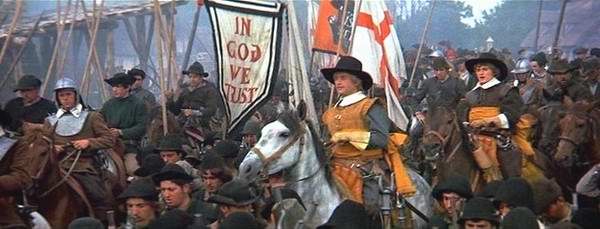Tuesday, August 14, 2007
Understanding Adam's Rebellion
To continue the conversation about a literal Adam a little further let us examine how not having a "real" Adam destroys the need for an actual Christ. Those of you who do not believe in a physical Adam as expressed in the beginning chapters of Genesis need to reconcile how Christ, who Paul explicitly says in 1st Corinthians 15:42-49 is the second Adam, can be the so-called second of something that did not previously exist? Or put in other words how Adam being a metaphor calls for a Christ to die for a fake rebellion.
I think those of you who deny Adam's reality do not truly comprehend how much the idea of there being no Adam affects the rest of Scripture. It would be like taking away the opening chapter of a novel and expecting to be able to understand the rest of the story. Someone who describes the creation text as myth or folklore must analyze what this does not only to the history of God's relationship to Israel but to their Christology. Because not only does the non-existence of Adam necessitate that God created the world sinful and evil but it requires that Jesus' death on the cross is an action that resolves God's mistake in making an already fallen creation to himself. Not that Jesus was reconciling us, who share in Adam's rebellion, to God but that God was reconciling his own blunder with himself. Michal Horton in his work Putting Amazing Back Into Grace quotes John Calvin who says,"The depravity and malice both of men and of the devil, or the sins that arise therefrom, do not spring from nature, but rather from the corruption of nature." In other words it is not that nature itself was created evil but that nature had to of its own accord fall from the perfection in which it was formed to begin with. This has to mean that at some point in the past an "Adam" was given the free will to sin or as the Second Chapter of the Scots Confession defines it:
"We confess and acknowledge that our God has created man, i.e., our first father, Adam, after his own image and likeness, to whom he gave wisdom, lordship, justice, free will, and self-consciousness, so that in the whole nature of man no imperfection could be found. From this dignity and perfection man and woman both fell; the woman being deceived by the serpent and man obeying the voice of the woman, both conspiring against the sovereign majesty of God, who in clear words had previously threatened death if they presumed to eat of the forbidden tree."
For Jesus' death on the cross to be as Scripture says it to be necessitates a literal Adam who fell from God's grace. A fake Adam creates a Christ who has failed and is a liar. For what need do we have of a Savior that saves us from a death that was his fault to begin with? What do we say when we know that Christ did not die because of our own rebellion but because of his own mistake? How can we say that the literally hundreds of times Adam's sin is called upon by the writers of the Old Testament to show forth the sin of Israel is mere allegory? How can we say Christ died for an allegory or a metaphor and be taken seriously? Adam's reality is VITAL for the gospel to be real. Without an actual Adam our faith is in vain because Christ's atonement is nothing more than a big "sorry about that". This is not the message of the gospel.
I think those of you who deny Adam's reality do not truly comprehend how much the idea of there being no Adam affects the rest of Scripture. It would be like taking away the opening chapter of a novel and expecting to be able to understand the rest of the story. Someone who describes the creation text as myth or folklore must analyze what this does not only to the history of God's relationship to Israel but to their Christology. Because not only does the non-existence of Adam necessitate that God created the world sinful and evil but it requires that Jesus' death on the cross is an action that resolves God's mistake in making an already fallen creation to himself. Not that Jesus was reconciling us, who share in Adam's rebellion, to God but that God was reconciling his own blunder with himself. Michal Horton in his work Putting Amazing Back Into Grace quotes John Calvin who says,"The depravity and malice both of men and of the devil, or the sins that arise therefrom, do not spring from nature, but rather from the corruption of nature." In other words it is not that nature itself was created evil but that nature had to of its own accord fall from the perfection in which it was formed to begin with. This has to mean that at some point in the past an "Adam" was given the free will to sin or as the Second Chapter of the Scots Confession defines it:
"We confess and acknowledge that our God has created man, i.e., our first father, Adam, after his own image and likeness, to whom he gave wisdom, lordship, justice, free will, and self-consciousness, so that in the whole nature of man no imperfection could be found. From this dignity and perfection man and woman both fell; the woman being deceived by the serpent and man obeying the voice of the woman, both conspiring against the sovereign majesty of God, who in clear words had previously threatened death if they presumed to eat of the forbidden tree."
For Jesus' death on the cross to be as Scripture says it to be necessitates a literal Adam who fell from God's grace. A fake Adam creates a Christ who has failed and is a liar. For what need do we have of a Savior that saves us from a death that was his fault to begin with? What do we say when we know that Christ did not die because of our own rebellion but because of his own mistake? How can we say that the literally hundreds of times Adam's sin is called upon by the writers of the Old Testament to show forth the sin of Israel is mere allegory? How can we say Christ died for an allegory or a metaphor and be taken seriously? Adam's reality is VITAL for the gospel to be real. Without an actual Adam our faith is in vain because Christ's atonement is nothing more than a big "sorry about that". This is not the message of the gospel.
Subscribe to:
Post Comments (Atom)












1 comment:
Well said.
I never could understand those who could posit a creator God who can speak the whole universe into existence, and then somehow doubt that he can do whatever he wants within his own creation. Is a literal Adam too hard for him? Does God need Darwin to help him out? Was Christ deluded when he mentioned Adam (obliquely) and Noah and Jonah(directly?) Are we actually better informed than Christ?
B
Post a Comment